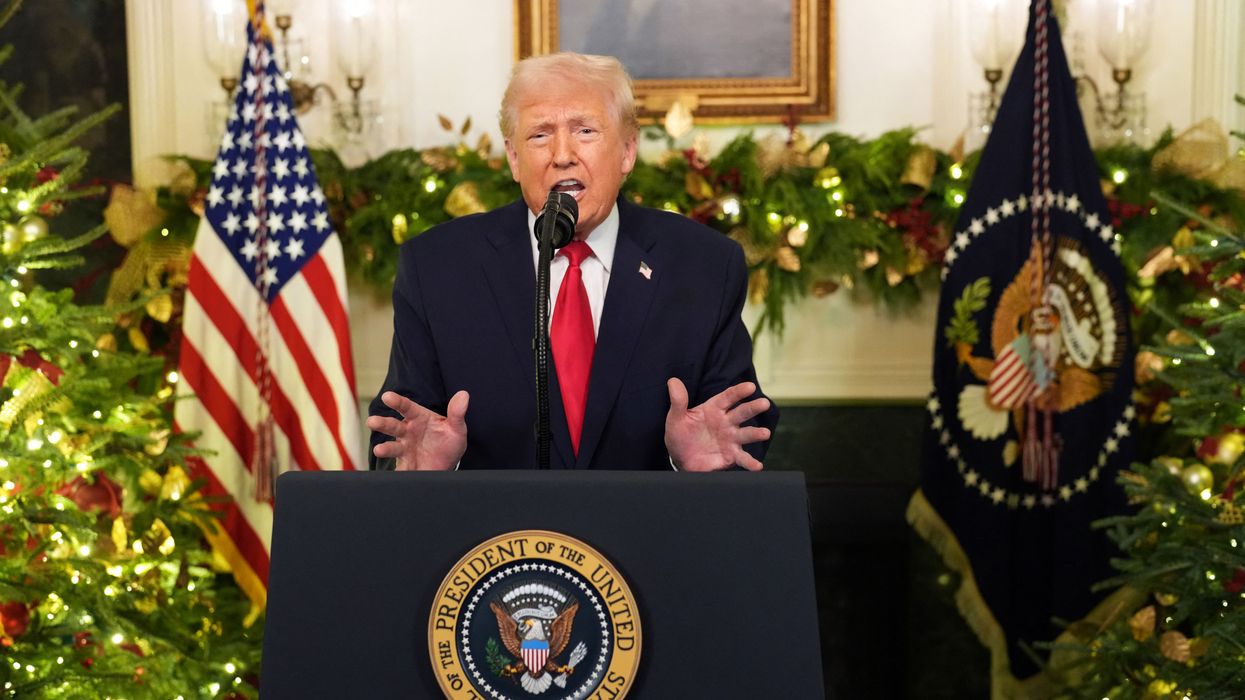Over 150 concerned New Yorkers, unions and Councilmembers rallied in front of a large sign spelling out #GreenNewDeal4NYC before a City Hall hearing on historic, globally-unprecedented city council legislation. The proposed legislation would fight climate change and create good jobs by requiring all large buildings in the city, the top source of the city's climate pollution, to slash their pollution by over 80% by upgrading to high energy efficiency standards.
The proposal would be the first comprehensive standards anywhere in the world to slash climate pollution from existing buildings, which are the top source of climate pollution in many cities, worldwide. In NYC, building emissions are responsible for about 70% of all city emissions. The prime sponsors of the legislation are Council Environmental Committee Chair Costa Constantinides and Council Speaker Corey Johnson, both who joined and spoke at the rally. At the hearing, the de Blasio Administration also testified in strong support of the bill.
"If we are going to save New York City, we have to start with the dirtiest buildings," said Council Member Costa Constantinides, Chair of the Committee on Environmental Protection. "Passing this bill doesn't just mandate a 40% carbon emission reduction by 2030. It protects families from losing their home, makes our air cleaner, and holds bad emitters like Trump Tower accountable. I am grateful for the support this legislation has already seen, because so many recognize the time to act is now."
"Now is the time to fight climate change. Just days ago, President Trump discredited his own administration's report warning that human activity is contributing to the planet getting warmer. He said, 'I don't believe it.' Well, I do. Clearly, it is up to cities to lead the way to protect our environment. Buildings are responsible for two-thirds of the city's greenhouse gas emissions. Mandating energy efficiency for large buildings is a critical next step to combating climate change and I am proud this Council is taking action. I thank Council Member Constantinides for his leadership on this issue," said Council Speaker Corey Johnson.
Immediately after the rally, the Council's Environmental Protection Committee held an overflowing hearing on the bill (Intro 1253). A wide range of climate, environmental justice, community groups, labor unions, institutions and activists testified in support of the bill, backed by a large crowd wearing stickers labelled "#GreenNewDeal4NYC."
Intro 1253 would achieve the pollution reductions that the world's scientists, convened by the UN, have determined is needed to stave off the worst of the climate crisis. In particular, the bill cuts climate pollution from covered buildings by over 40% by 2030 and over 80% by 2050 (in combination with a greening electric grid). The bill requires the city's least-efficient, most-polluting large buildings to begin cutting their pollution in 2022.
"Unless the world radically slashes climate pollution, New York City will cook while slowly slipping under water, and we will be hit by far more extreme weather such as hurricanes, heat waves, intense rain and flooding. But there's also opportunity in solving this crisis," said Rachel Rivera, a Sandy survivor and board member of New York Communities for Change (NYCC). "It's time for a Green New Deal for New York of good, union jobs to clean up this city's dirty, polluting buildings. Councilmember Constantinides and Speaker Johnson's bold, transformative legislation gets it done and is a model for the world. It's time for the Council to pass it and the Mayor to sign it."
Intro 1253 legislation creates good, union jobs that hire from communities of color. These jobs would be career-track, sustainable jobs that would last for decades as about 50,000 large buildings throughout the city transformed to high energy efficiency over time. Buildings would need to end energy waste in order to meet high energy efficiency standards. Overall, the bill would create thousands of jobs in design, renovation and construction for upgrading building energy efficiency.
QUOTE SHEET:
"After years of hard work the Council has a bill which balances the concerns of reducing emissions locally, fighting climate change, and protecting housing affordability. In the wake of storms and extreme weather as well as increasingly dire predictions about the impact of climate change on our communities right now is the time to act," said Stephan Edel, Project Director at New York Working Families.
"In another year of devastating storms, fires, flooding and droughts as well as an IPCC report warning of the dire, and looming impacts of global climate change, we cannot afford any further inaction. By dramatically cutting pollution from the City's largest source, intro 1253 will create jobs, save lives, clean the air and protect low-income tenants. These are the bottom-line principles around which our Climate Works for All coalition has been organizing for several years. We applaud Council Member Constantinines and Speaker Johnson for pushing this first-of-its-kind legislation" said Brett Thomason, Climate Organizer for ALIGN-NY.
"To protect our communities from grave climate catastrophes, we must act boldly and quickly," said Petra Luna, tenant leader at Make the Road New York. "We applaud Councilmember Constantinides and Speaker Johnson for hearing our call and putting forward a bill that aims to tackle our largest source of climate pollution: NYC's large buildings"
"Intro 1253 is climate legislation that actually addresses the needs and priorities of the low-income communities and communities of color who are disproportionately burdened by the impacts of climate change. It cuts emissions at the rate recommended by UN climate scientists while protecting affordable housing residents from unfair, permanent rent hikes. The bill will also help New Yorkers of color participate in and directly benefit from the emergent clean energy economy by creating thousands of good jobs each year, which will help strengthen our communities for generations to come. This is exactly what New York City needs: bold climate policy grounded in principles of justice," said Aditi Varshneya, Community Organizer at WE ACT for Environmental Justice
"The NYC Dirty Buildings bill is truly an example of a Green New Deal in action. It gets to the center of real solutions to the climate crisis: creating thousands of good jobs for New Yorkers most impacted by storms like Sandy, while tackling the City's biggest source of emissions. While the Trump administration props up fossil fuel interests, frontline communities are leading the charge for a Fossil Free New York and making sure those most responsible for climate change pay their fair share," said Betamia Coronel, native New Yorker and 350.org National Organizer.
"After all the bad news predicting catastrophic climate disasters that will certainly intensify unless we completely get off fossil fuels within the next 12 years, the 'Dirty Buildings Bill' is a global first step for diminishing carbon emissions from big city big buildings. Since 70% of the carbon emissions in NYC come from big buildings, this retrofitting bill will reduce carbon emissions significantly limiting the climate changing effects of their heating and cooling systems while saving energy costs, making apartments and offices more comfortable and making the air in NYC healthier to breathe. This bill will create good paying, skilled jobs and protect low income and rent controlled/regulated apartment dwellers. We are looking forward to more cities following suit and for the City and State to enact more climate solutions to address the urgent crisis of climate change," said Nancy Romer, a member of the leadership team of the Peoples Climate Movement-NY.
"The IPCC report tells us we have 12 years to meet the greatest existential threat to our city and world. We're here today supporting a #GreenNewDeal4NYC because this bill meets the scale of our greatest collective challenge by tackling the dirtiest buildings in New York City that produce over half of our climate pollution. The time is now for a transition to a fossil free future, and New York City can lead the way," said Sarah Lyons, a member of the Organizing Committee, NYC-DSA Ecosocialist Working Group.
"As nations around the world meet in Poland to discuss climate action, the New York City Council is actually moving that forward," said Carl Arnold, chair of the New York City Group of the Sierra Club. "Swedish fifteen-year-old Greta Thunberg just told world leaders that since they're acting like children by doing nothing that will essentially solve the climate crisis, people at the grassroots must take responsibility for saving human civilization. This legislation represents the fruits of dedicated effort by exactly these grassroots here in America's largest city. We urge the City Council to pass it," said Carl Arnold, Chair of the New York City Group of The Sierra Club.
Groups and unions at the rally included: ALIGN NY, Beacon High School Environmental Club, CWA Local 1180, Democratic Socialists of America, Environmental Defense Fund, Food & Water Watch, IBEW Local 3, Jewish Climate Action Network, Make the Road New York, New York City Coalition for Employment and Training, New York City Environmental Justice Alliance, New York Communities for Change, New York Tenants & Neighbors, People's Climate Movement - New York, PSC-CUNY, Sane Energy Project, Sierra Club NYC Group, Sunrise Movement, TenantsPAC, WE ACT for Environmental Justice, Working Families, UPROSE, 350.org, 350Brooklyn and 350NYC.




